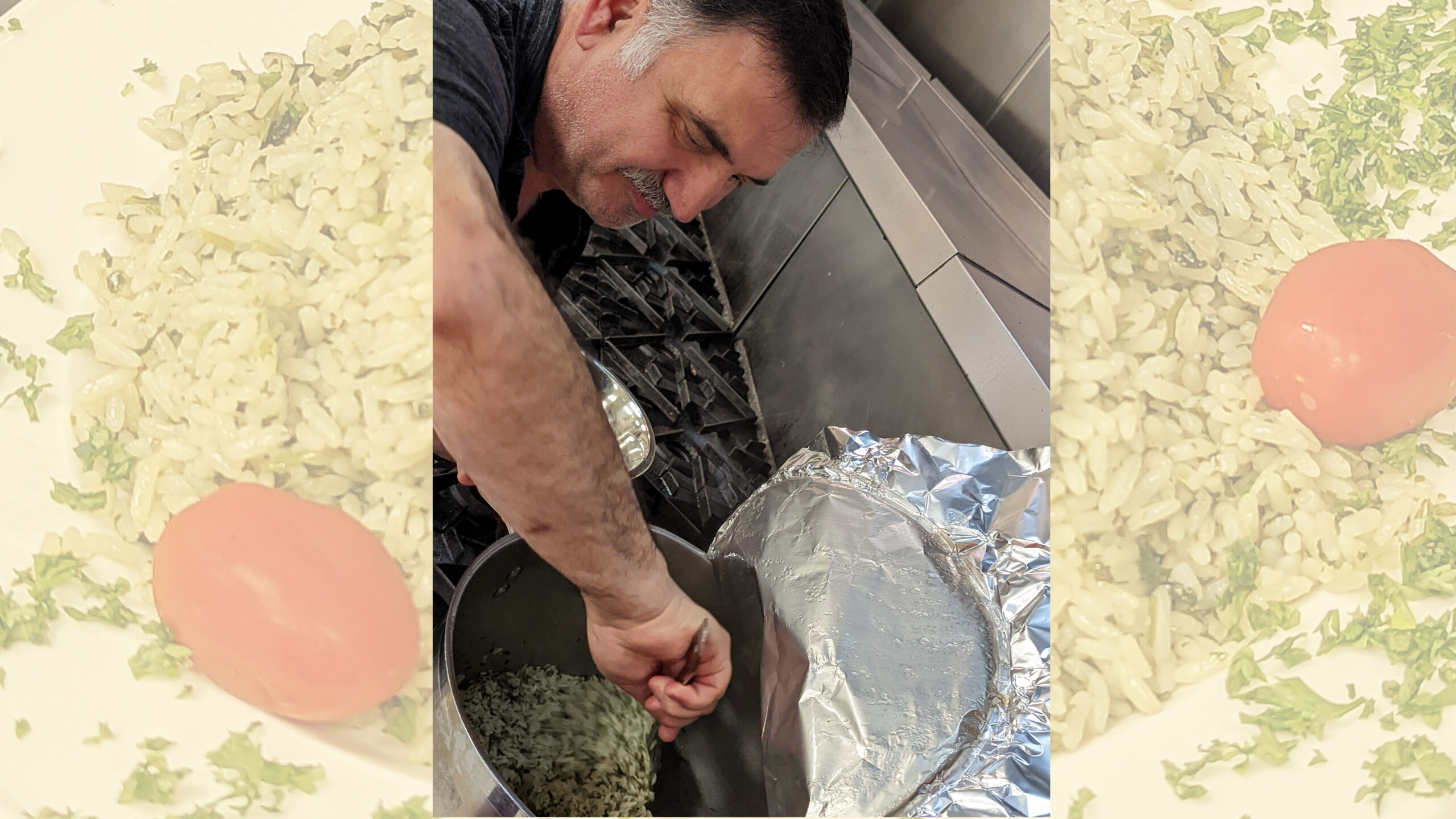“I usually tell people I’m French,” explains Alex Borukhov, whose fluent English has an accent that makes people wonder, “really, I’m from Tajikistan. But Americans don’t know where that is.” Borukhov’s native land is in Central Asia, surrounded by Afghanistan, China, Kyrgyzstan, and Uzbekistan. When he was growing up, the country was part of the Soviet Union. Under Soviet rule, Judaism was outlawed. His family was quite religious Bukharian Jews; a community historically found broadly in the region for centuries. His grandfather went to jail twice for observing Jewish tradition and teaching Judaism. So the family made a conscious decision not to teach Judaism to the younger generation lest it endanger their lives. “Still, I had a bar mitzvah. My stepfather worked in the government, so he knew how to smooth things over. We called it a birthday party, but my mother made sure I knew that this was special; this was my bar mitzvah.”
 Today, Borukhov is a kosher caterer in Atlanta, Georgia. “I was a cook in the Russian army; I had to cook for 800 or 900 soldiers every day, we did not even get to cook for the officers, so I learned to cook some basic things.” When the Soviet Union dissolved and ethnic tensions set in, Tajikistan exploded into violence. Borukhov went to live in Moscow. There he worked first in banking then in the oil business. In 1996, he joined his wife Zoya in Atlanta, where she and her extended family had emigrated. Though his time in the military did not prepare him for a career in fine dining, he decided to give the restaurant world a try. And after training with a variety of chefs and co-owning his own establishment, he paired up with Atlanta’s historic Sephardi synagogue to set up Alex Catering.
Today, Borukhov is a kosher caterer in Atlanta, Georgia. “I was a cook in the Russian army; I had to cook for 800 or 900 soldiers every day, we did not even get to cook for the officers, so I learned to cook some basic things.” When the Soviet Union dissolved and ethnic tensions set in, Tajikistan exploded into violence. Borukhov went to live in Moscow. There he worked first in banking then in the oil business. In 1996, he joined his wife Zoya in Atlanta, where she and her extended family had emigrated. Though his time in the military did not prepare him for a career in fine dining, he decided to give the restaurant world a try. And after training with a variety of chefs and co-owning his own establishment, he paired up with Atlanta’s historic Sephardi synagogue to set up Alex Catering.
 Professionally, Borukov prepares a wide range of cuisine from French to Russian and even Indian food. But at home, he often prepares Bukharian recipes. For Rosh Hashana, there will likely be a lamb stew on the table, though Borukov is quick to explain that the dish is not a stew in the traditional sense because the meat and potatoes are cooked separately until the last moment, “but in America, we call it a stew.” He will also make a well-known Bukharian green rice pilaf called Bachash. It is commonly topped with fresh chopped vegetables, but for the New Year, Borukov recommends dried fruit and pomegranate seeds.
Professionally, Borukov prepares a wide range of cuisine from French to Russian and even Indian food. But at home, he often prepares Bukharian recipes. For Rosh Hashana, there will likely be a lamb stew on the table, though Borukov is quick to explain that the dish is not a stew in the traditional sense because the meat and potatoes are cooked separately until the last moment, “but in America, we call it a stew.” He will also make a well-known Bukharian green rice pilaf called Bachash. It is commonly topped with fresh chopped vegetables, but for the New Year, Borukov recommends dried fruit and pomegranate seeds.
His wishes for the New Year are “health, more health, and health. And also peace in the world.”
Bachash
Ingredients
- A pound of turkey or beef or mutton or lamb or chicken gizzard or a mixture of the above meats every combination is possible. Coarsely chopped, not finely ground.
- 3 Cups small grain rice (sushi or risotto)
- 4 Bundles Cilantro
- 2 Bundles Parsley
- 1 bunch scallions
- Rendered lamb fat Or Canola Oil
- Salt to taste
- Water
Instructions
- Grind the meat with a meat grinder or chop large holes with a mixer or manually. Note – Do not get to the texture of minced meat, it must remain textured blocks. If using turkey – do not remove the fat! It is needed to make the dish come together.
- Soak the rice in boiling water. Let it sit for half an hour.
- Drain the rice and let it sit in a colander to dry.
- Finely chop the green onions.
- Finely chop the cilantro and parsley – including the stems that have an intense flavor and add a lot of flavor to the dish. It is important to cut as thin as possible, especially the stems, but do not grind in any way! (In order to streamline the process you should use a knife cleaver)
- Fry the beef (or other meat) with scallions and half a cup of oil.
- After the meat changes color, add a cup of water and a little salt and simmer for about half an hour.
- Add the meat into the chopped parsley and coriander, stir and cover everything with water.
- Bring to a boil, close the pot, and cook over low heat for another half hour.
- Up to this point, everything can be done in advance
- Add the washed rice (if you prepare the meat ahead of time – you have to bring the pot to a boil before adding the rice).
- Mix well.
- Add another half cup of oil or melted lamb fat.
- Add water to the height of the rice + one finger (approx. half an inch more than the rice).
- Bring to a boil and place on the lowest possible flame, cover the pan and cook for about 20 minutes.
- Once the rice absorbs all the liquid – stir gently with a fork to open the rice.
- Wrap the lid and sides of the pan with a kitchen towel to save steam and cook on a low flame. Occasionally open the pot and stir gently with a fork.
- Leave on the low burner or the oven at 280 Fahrenheit, without a towel – but wrapped in aluminum foil for 45-50 minutes.
- It is now ready. Enjoy!
Note: at the bottom of the pot you will have a layer of roasted rice which is considered particularly tasty. Bukharians call it “tdigi” and it is traditionally served to the head of the family or the most important person attending dinner.








